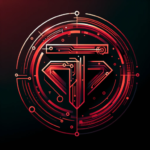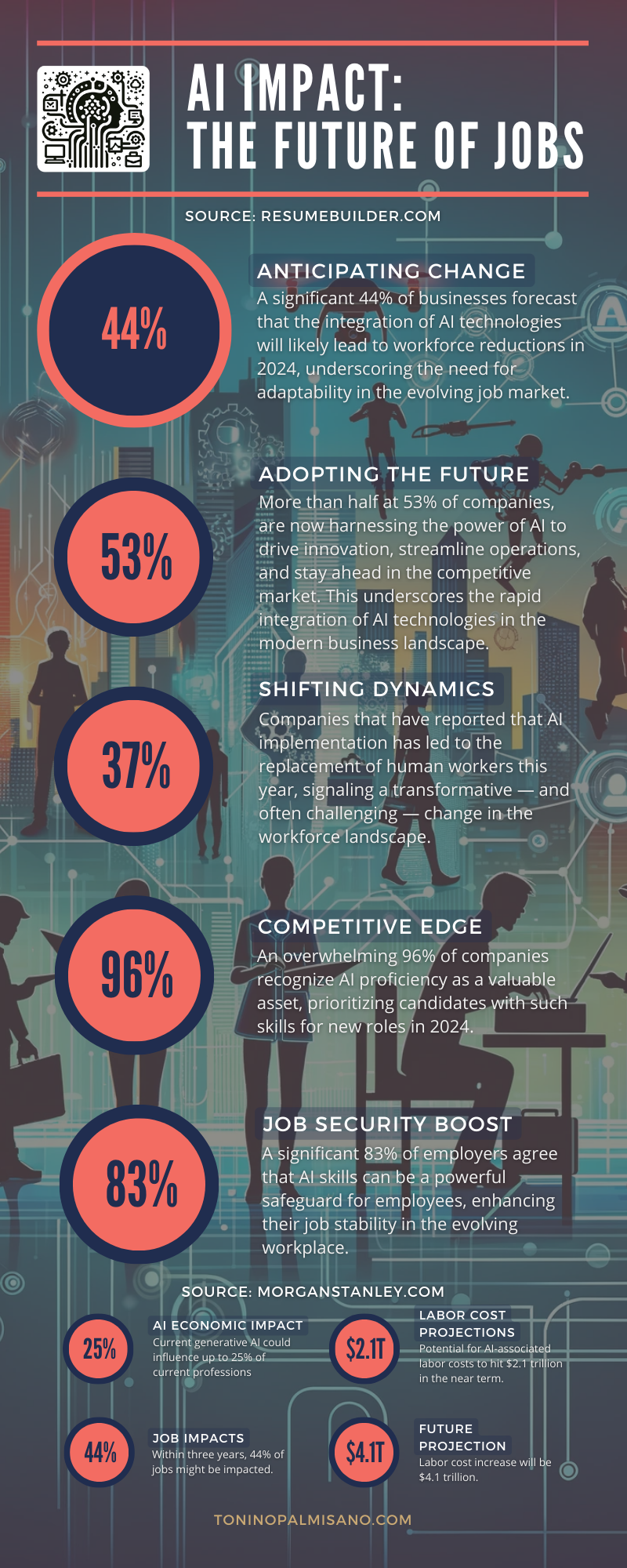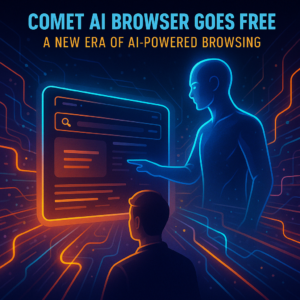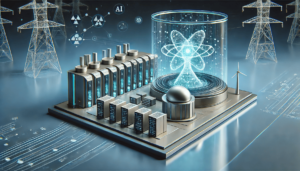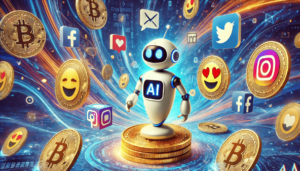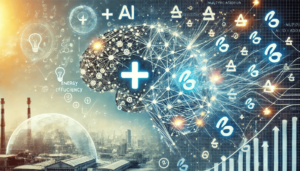AI Frontiers: Mastering the Workforce Evolution in the Age of Intelligent Tech
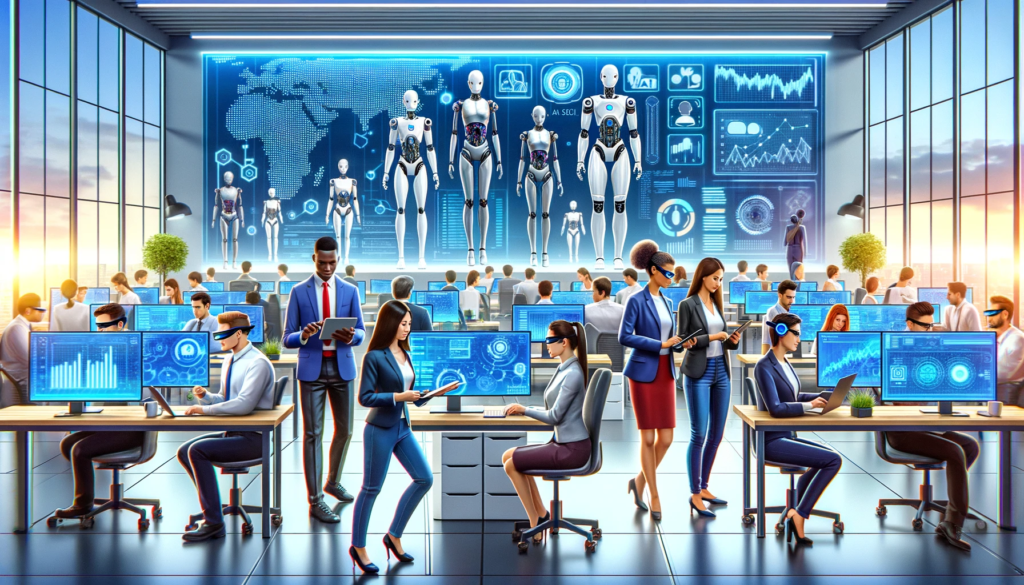
Illustrating the New Era of Work: Humans and AI in Strategic Partnership
As the business landscape evolves, AI in the workforce emerges as a transformative power reshaping industry norms and job markets. This article explores the historical journey of AI, its current applications in business, and its profound impact on the future of work. Join us in examining how companies and professionals are adapting to the unstoppable tide of AI’s influence.
The concept of AI, once a fantastical notion, has now taken a front seat in driving innovation across sectors. Our exploration begins with a look back at the technological milestones leading to AI’s current prominence in business strategies.
In a pivotal study by ResumeBuilder.com, we find that 53% of companies are integrating AI technologies, signaling a major shift in the workforce dynamics. Learn what this means for job security and career development as we head into 2024.
Seth Carpenter, Global Chief Economist for Morgan Stanley, notes that current generative AI technologies could impact a quarter of existing occupations, with associated labor costs potentially reaching $2.1 trillion, and within three years, this could rise to 44% of occupations affected, and $4.1 trillion of associated labor costs.
The Dual Impact of AI on Employment: Efficiency vs. Workforce Disruption
As businesses increasingly integrate artificial intelligence into their operational fabric, a complex narrative unfolds, one that balances the scales between heightened efficiency and potential workforce disruption. A pivotal survey conducted by ResumeBuilder.com throws light on this dichotomy, revealing that 37% of companies employing AI technology have reported a consequential reduction in their workforce in 2023. This statistic not only highlights the direct influence of AI on employment but also signals an emergent need for a paradigm shift in workforce strategy.
When delving into the granularities of AI’s influence, it’s imperative to acknowledge the specific areas within business processes where AI has rendered human roles redundant. From automated customer service bots to advanced data analytics, the array of functions AI is taking over is expanding. This takeover, while streamlining operations and cutting costs, also casts a spotlight on the evolving job descriptions and the rising demand for a new kind of workforce agility.
The role of the modern employee is now undergoing a rapid transformation, necessitating a robust technical roadmap for adaptation. It’s no longer about competing with AI but rather about complementing it. Professionals are encouraged to cultivate a deep understanding of AI capabilities and limitations, focusing on skills and tasks where human intuition and creativity remain irreplaceable. These include complex decision-making, emotional intelligence, and tasks requiring nuanced judgments — areas where AI, despite its advancements, cannot fully replicate the human touch.
In light of these developments, technical expertise in AI not only becomes a valuable asset but a critical component for career longevity. The ResumeBuilder.com survey emphasizes that nearly all companies value AI skills in their new hires, with 96% acknowledging the benefits of such expertise. This reflects a market that increasingly favors those who can navigate the intricacies of AI, harness its potential, and mitigate its limitations within the corporate ecosystem.
The message is unequivocal for tech-savvy professionals: the future is now, and it’s wired with AI. By harnessing data from credible sources like ResumeBuilder.com and leveraging advanced analytics, professionals can strategically position themselves at the vanguard of their respective fields, steering clear of obsolescence and securing their relevance in an AI-dominated corporate landscape.
AI’s Ascension: A Catalyst for Corporate Restructuring and Skill Demand
In the rapidly advancing domain of artificial intelligence, the data speaks volumes about imminent corporate restructuring. According to insightful research by ResumeBuilder.com, a striking 44% of companies anticipate AI will precipitate layoffs by 2024. This statistical foresight underscores the need for businesses to recalibrate their talent strategy and for professionals to align their skill sets with the evolving demands of an AI-driven marketplace.
The corporate world is poised at the brink of a transformation, one where AI’s integration into business operations necessitates a forward-thinking approach to workforce management. For businesses, the focus shifts towards investing in AI-driven tools and platforms that promise to redefine efficiency and productivity. However, this also calls for a nuanced understanding of how automation and intelligent systems will reshape job roles and functions.
With nearly half of the companies bracing for an AI-induced reorganization, the modern workforce must embark on a journey of technical upgrading. This involves a deep dive into AI methodologies, learning to manage and collaborate with smart systems, and developing a strategic edge in areas where human expertise is indispensable. From analytical reasoning to managing complex stakeholder relationships, the skills that define career resilience are those that AI cannot automate.
Job security in the upcoming years hinges on a clear intersection: AI competency. As highlighted by ResumeBuilder.com’s survey, there is an implicit understanding in the corporate sector that proficiency in AI not only enhances an individual’s role but also cements their place within the organization. Employers are now prioritizing candidates who bring AI fluency to the table, viewing such skills as a significant investment in their company’s future-proofing endeavors.
For professionals, the convergence of AI and employment is not a distant future — it’s a pressing reality. Acknowledging this, individuals must leverage this critical juncture to amplify their technical understanding of AI. This pivot could mean the difference between remaining relevant or becoming a redundancy in a market where AI competency is no longer a luxury but a necessity for career sustenance and growth.
The Competitive Edge: AI Proficiency as a Key Hiring Criterion
In the wake of the AI revolution, ResumeBuilder.com reveals a compelling trend: 96% of companies express a distinct preference for AI-skilled candidates. This overwhelming statistic from the survey is a clarion call to job seekers and employees alike, indicating that AI proficiency is swiftly becoming a pivotal differentiator in the job market.
In the current job landscape, AI skills are evolving into a new currency, one that could potentially dictate hiring decisions and career progressions. Employers are on a quest for talent that can navigate the complexities of AI, harness its potential, and steer companies through the transformative waves it brings. A candidate’s familiarity with AI technologies, machine learning concepts, and their applications in real-world scenarios is becoming a significant facet of their professional value proposition.
Talent acquisition strategies are being recalibrated to prioritize AI savviness. This is not simply about understanding algorithms or coding; it’s about a holistic grasp of how AI can drive business growth, optimize operations, and innovate products and services. Recruiters are now tasked with identifying not just technical know-how but the strategic application of AI skills that align with business objectives.
The burgeoning demand for AI skills has illuminated a gap in the current talent pool, prompting a surge in AI-focused education and continuous learning initiatives. Professionals are turning to specialized courses, certifications, and hands-on projects to bridge this gap. Organizations, too, are investing in upskilling programs to cultivate an AI-adept workforce, recognizing that the future belongs to those who can coexist and collaborate with intelligent systems.
The message from the data is unequivocal: to remain competitive, both job seekers and employers must adapt to the AI-oriented job landscape. For individuals, this means embracing AI learning as an integral part of career development. For employers, it necessitates creating environments that nurture AI learning and experimentation, ensuring that their teams are equipped for the AI-augmented future.
AI Fluency: The New Job Security Safeguard
In a labor market bracing for the AI wave, ResumeBuilder.com reports a striking insight: 83% of companies affirm that employees with AI skills are more likely to retain their jobs. This statistic underscores the significance of AI fluency as a safeguard for job security in an increasingly automated corporate landscape.
As AI becomes more integrated into business operations, AI literacy emerges as a defensive armor for professionals. It’s no longer about staying ahead; it’s about not being left behind. The survey suggests that employees who demonstrate AI competency can effectively future-proof their careers, turning potential obsolescence into a strategic advantage.
For businesses, the imperative is clear: cultivating an AI-ready workforce is not an option but a strategic necessity. Companies that invest in AI training and development programs are not only preparing their employees for the future but are also fortifying their competitive position in an AI-driven market.
Professionals are now integrating AI skills into their development plans, and employers are looking for ways to support this integration. From data analysis to machine ethics, the range of competencies deemed valuable is broadening. The technical acumen to work alongside AI is now paralleled by the need for strategic insight into leveraging AI for decision-making and innovation.
The intersection of AI competence and job retention strategies is becoming increasingly prominent. As AI reshapes industries, the workforce is recalibrating, prioritizing the acquisition of AI skills as both a means of securing their roles and contributing to their organization’s resilience in the face of technological disruption.
Generative AI: The Unseen Force Reshaping Job Landscapes
The advent of generative AI is not just a technological evolution; it’s an economic force that is set to redefine the labor landscape. Seth Carpenter, Global Chief Economist at Morgan Stanley, projects a staggering impact with current generative AI technologies potentially affecting a quarter of existing occupations, carrying associated labor costs that could reach up to $2.1 trillion.
Within the next three years, this influence is expected to grow, affecting 44% of occupations and escalating associated labor costs to approximately $4.1 trillion. This underscores the transformative power of generative AI, which stands at the cusp of driving a major economic shift. It’s a trend that indicates both an opportunity for innovation and a clarion call for comprehensive workforce reskilling to harness the benefits of AI while mitigating the risks of job displacement.
As policymakers and industry leaders grapple with these changes, the focus intensifies on balancing the enhancement of productivity and the creation of new job categories with the imperative to address the potential disruption to current labor markets and labor standards.
The AI Horizon: 2024’s Workforce Forecast
In 2024, we stand on the precipice of a definitive shift in workforce dynamics, driven by AI integration. The ResumeBuilder.com survey indicates that a third of companies are poised to replace human labor with AI technologies, a trend that echoes Morgan Stanley’s prediction of generative AI influencing over 40% of occupations.
With 96% of companies valuing AI skills in potential hires, as per ResumeBuilder.com, and the increasing importance of generative AI in various sectors, it’s clear that proficiency in AI will become a significant marker of job security and employability in 2024 and beyond.
Morgan Stanley’s analysts project that the diffusion of generative AI will not only reshape jobs but also enhance productivity on a macroeconomic scale. This could lead to a ripple effect of faster GDP growth and influence monetary policies worldwide.
The potential for AI to disrupt current job roles will likely catalyze policy innovation and the creation of robust workforce reskilling initiatives. The White House’s recent executive order, which seeks to address the labor market impacts of AI, is a precursor to the kind of policy responsiveness we can expect in the future.
As we advance into 2024, businesses and individuals alike will need to adapt to the AI-driven landscape. The capacity to integrate AI into one’s skillset will not only be a competitive advantage but a necessity for navigating the future job market.
Embracing the AI Paradigm: Key Takeaways and Strategic Imperatives
The data underscores a clear trend: AI is reshaping the workforce ecosystem with unprecedented speed. With over a third of companies preparing to introduce AI into their operations, the disruption in job roles and the surge in demand for AI skills is not hypothetical—it’s the reality of the current employment landscape.
In an AI-augmented job market, AI skills are not just an asset; they’re increasingly a currency of employability. As 96% of companies attest to the value of AI skills, the message is unequivocal—employees must pivot towards acquiring AI literacy and proficiency to secure their positions and progress in their careers.
The infusion of AI into business processes is set to unlock new levels of productivity, stimulating economic growth and potentially recalibrating inflation and interest rates. For businesses, this signals an opportunity for growth; for employees, it’s a call to align with the emerging economic realities.
Both the private and public sectors must navigate the AI transition with foresight and responsibility. The imperative for policy innovation, workforce retraining, and education in AI is clear. The creation of a workforce that is not only adaptable but also adept in AI will be fundamental to harnessing the full potential of this technological revolution.
The findings articulate a proactive path forward: businesses should integrate AI strategies into their core operations, and employees should embrace AI as a critical component of their professional development. As AI becomes synonymous with efficiency and innovation, adaptability will be the cornerstone of success in the evolving job market.
